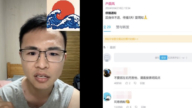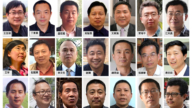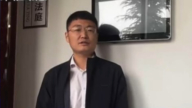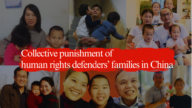【新唐人2014年09月06日訊】深圳民間法律工作者汪龍控告中國聯通封鎖谷歌案,近日在深圳福田區法院審理完畢,但是沒有做出當庭宣判。事後,汪龍投訴,法院職員強迫他在與陳述不符的筆錄上簽字,他質疑法院涉嫌存在違法問題。
汪龍表示,從5月份開始,他使用的中國聯通網路就無法訪問Google、Gmail等網站,於是他將中國聯通和中國聯通深圳分公司告上法庭。
這起訴訟被稱為「封鎖Google全球第一案」,由深圳福田法院在9月4號開庭審理。被告中國聯通深圳分公司只是委託律師出庭,中國聯通則沒有人出席。
汪龍:「在審判過程中,審判員問了被告代理員一個問題,你們的網路能不能訪問Google這些網站?被告代理人他也一時沒辦法回答,也不知怎麼回答。後面舉了一個例子說,他在律師所裡面用電信的寬頻是訪問不了Google的。但是這個時候,被告代理人還沒有把話說完,審判員就說,『無法訪問,但是與運營商無關』。相當於代替被告回答了。」
汪龍表示,代理審判員白松靈,讓記錄員按照「無法登錄但與運營商無關」的大意記入筆錄,將不屬於當事人回答的內容,當作當事人的回答,記入了筆錄。
汪龍對此提出抗議,要求代理審判員迴避。但卻遭到一位法官稱這是「院長的口頭決定」而駁回。
庭審結束後,法院沒有立即作出宣判。
汪龍表示,庭審時的蔡姓記錄員,並不是福田法院的法官或職員,開庭時也沒有佩戴證件;所做的筆錄內容也與他的陳述不符,所以他拒絕在筆錄上簽字。
之後,蔡姓記錄員強行要汪龍簽字,並破口大駡,甚至要關門對汪龍採取暴力行動。汪龍只得現場報警,蔡姓記錄員才作罷。
其實,在開庭之前,汪龍就接到深圳龍崗區國保的電話,說在兩點鐘約見他。汪龍拒絕後,把消息在推特上發出,並寫道:「如果在本信息發出後的6個小時內我沒有再次更新,說明我有可能被強迫失蹤了,請持續關注!」
汪龍:「這個官司能不能告得贏,大家心裡都明白,甚至就像很多網民所說的,這個官司肯定是告不贏的。但是我認為這個官司意義在於體現,通過我去起訴,包括開庭一系列的過程,來告訴大家公民是有這個權利的,是需要主張這個權利的。」
汪龍認為,如果沒有人去做,公民的這個權利肯定不能實現;如果所有人都去主張的話,權利才可能實現。
廣州自由民主人士徐琳:「官司打贏不是最主要的。他也是通過這件事情喚醒大家這種抗爭意識,讓大家更加了解這個專制的邪惡,同時用他的行動帶動大家。」
廣州自由民主人士徐琳表示,汪龍的行為是對言論封鎖的一種抗爭。通過他的這種抗爭,網民知道政府在遮罩很多網站。這可能會引發網民的好奇心,想法了解更多的國外媒體,從而打破政府的管控。
大陸律師劉先生指出,中國沒有一條法律規定互聯網不能訪問境外網站,只是說不能上所謂的危害國家安全和淫穢色情網站。顯然,Google、Gmail不屬於此列,但法院肯定會找到藉口,為國家封網的行為背書。
大陸律師劉先生:「明文規定的法律或者法規也好,司法解釋也好,沒有一條法律依據,給他們這些政府部門屏蔽相關的網站,來提供支援。」
劉律師說,中國有一些法律的解釋權就在法院,而且法院還會利用嫻熟的「踢皮球戰術」搪塞網民。例如,之前有上海網民做過類似的起訴,但上海法院以網民能「通過代理伺服器訪問」為藉口,直接判網民敗訴。
採訪/田淨 編輯/宋風 後製/肖顏
First Lawsuit against Mobile Censorship Involves Court Perjury
Wang Long, a legal worker in Shenzhen, filed a lawsuit against China Unicom, the State-owned mobile service provider, for blocking access to Google. The hearing was conducted in Shenzhen Futian District Court. A decision has yet to be announced by the court. Wang Long complains that court staff forced him to sign a record inconsistent with his statement. He suspects the court is violating the law.
Wang Long indicates, he brought both China Unicom and the Shenzhen Branch of China Unicom to court for lack of access to Google’s online services such as Google and Gmail since May.
This lawsuit is known as the first against China’s censorship of Google. Shenzhen Futian Court conducted the hearing on Sept. 4.
Shenzhen Branch of China Unicom was represented by a lawyer, but no one was present on behalf of China Unicom.
Wang Long: “During the hearing, the judge asked the plaintiff’s agent, ‘Can your network access Websites such as Google?'"
The agent could not answer right away and did not know how to answer this question. He gave an example: the broadband telecommunications in his law firm has no access to Google. But, before he could finish his sentence, the judge said, “Having no access, but is irrelevant to the operating vendor." It is simply answering on behalf of the plaintiff."
Wang Long indicates that the acting judge Bai Songling asked the court registrar to record “Having no access, but is irrelevant to the operating vendor."
The statement not belonging to the plaintiff was recorded as it was.
Wang Long protested by asking the acting judge to be excused.
Another judge dismissed his request by saying that it is the verbal decision of the court president.
The court did not immediately make the decision on the hearing day.
Wang Long points out, the registrar surnamed Tsai is not a judge or staff member of Futian Court, and did not wear ID. Wang Long refused to sign the record as the transcripts were made inconsistent to his statement.
Registrar Tsai demanded Wang Long sign the paper, scolded him and even attempted to conduct violence on Wang Long by shutting the door.
Tsai finally stopped when Wang Long called the police.
In fact, Wang Long had received a phone call from national security in Shenzhen Longgang District before the hearing asking to meet him at two o’clock.
Wang Long rejected the meeting and wrote on Twitter: “If I do not update again within six hours after this message, I may have been forced to disappear. Please pay attention."
Wang Long: “Nobody knows if this case will win, or like many mobile phone users have said, there is no way this case will win.
But I think the significance of this lawsuit, including the process of the hearing, is to tell people that citizens have the right and should insist on the right."
Wang Long believes, citizen rights can only be achieved when everyone advocates the right.
Guangzhou activist Xu Lin: “It is not about winning the case. He tried to wake up our conscience to resist and to learn about the evilness of this tyranny. Meanwhile, he tried to show an example with his action."
Xu Lin believes Wang Long’s behavior is a protest against blocking free speech. His protest reveals the many masks of mobile websites by the government. This may trigger mobile phone users’ curiosity to break the censorship and learn more about foreign media.
Chinese lawyer Mr. Liu explains, there is no legal regulation on accessing foreign Websites, but only on those which endanger national security or allow pornography.
Obviously, Google and Gmail do not belong to any of them.
But the court will certainly find any excuse to endorse the Internet blockade.
Lawyer Liu: “There is no legal support for these government agents to mask these Websites, whether it is the law or judicial interpretation."
Lawyer Liu indicates that courts reserve the right to interpret the law in China. Courts also prevaricate and pass the buck around.
For example, Shanghai court once ruled against a similar lawsuit with the excuse of “gaining access through a proxy server."
The mobile phone user lost the case.
Interview/TianJing Edit/SongFong Post-Production/XiaoYan

























